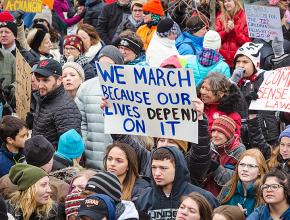Debating gun violence in Madison
reports from Madison on a debate on gun control at the University of Wisconsin that showed the limits of the current conversation in mainstream politics.
A RECENT debate on gun control hosted by the University of Wisconsin's (UW) Political Science Student Association (PSSA) brought together 75 people hear speakers from the UW Madison chapter of the International Socialist Organization, College Democrats, College Republicans, Young Americans for Liberty and Young Americans for Freedom.
The event came amid student-led protests against gun violence across the nation following the shooting in Parkland, Florida, which has spurred mass walkouts and demonstrations. In Madison, a March 14 day of action and walkouts saw a 3,000-person demonstration, and 5,000 turned out for the March for Our Lives on March 24.
Many of those in the audience were sympathetic to the pro-National Rifle Association (NRA) positions of the College Republicans, Young Americans for Liberty and Young Americans for Freedom. As the debate kicked off, these three groups immediately became indistinguishable.
College Democrats panelist David Pelikan began the debate by explaining that he understands "the cultural importance that guns have in this state."

For both Pelikan and the right-wing panelists, the key question in the debate was distinguishing between "law-abiding citizens" and those with mental illness or a criminal background. Pelican argued for "common sense gun control" to prevent people on the no-fly list or those that do not pass certain mental health requirements from buying guns.
While Pelikan emphasized his support for the amendment, and the libertarians tripped over themselves in support of NRA positions, ISO member Scot McCullough broadened the debate, giving attendants an important history lesson about the roots of violence in U.S. society:
The European colonies on this continent were the beginnings of a brutal and barbaric land-grab and labor-grab. Even before the term "Manifest Destiny"--meaning the right of whites to all the land from Atlantic to Pacific--was in use, it was the policy of the settlers...
Labor was kidnapped from Africa and enslaved to meet the demand. These twin projects, of stealing land and then forcing others to work it, required a tool: the gun...How do I interpret the Second Amendment? As a tool to empower the "pioneers" to commit genocide on any who wouldn't get out of the way.
WHEN THE moderator asked the panelist their positions on banning assault rifle sales and raising the legal age to purchase a gun to 21, McCullough called for banning the manufacture of assault rifles, while Pelikan continued to push for mental health requirements.
McCullough responded to Pelikan's argument:
This totally misses the point and is a dangerous concession to the notion that a specific subsection of the population should be stripped of certain rights or have liberties taken away that are enjoyed by the rest of the population.
It is not only a wrong-headed, non-solution--it is actually part of the problem of attacking and bullying the vulnerable and marginalized, and blaming them for society's structural and cultural ills. Gun violence is a social issue, and solutions based on profiling individuals--especially those suffering the oppression of disability--will only make our society more violent.
When asked what a bipartisan compromise on gun control could look like, Andrew Stein of Young Americans for Freedom explained that he supports current gun laws that "restrict gun ownership of those who have been convicted of felonies or violent crimes."
But as Michelle Alexander explains in The New Jim Crow, the label of "felon" and the loss of rights associated with it are part of the expression of systemic racism in the U.S., as people of color are disproportionately prosecuted for and convicted of such crimes.
Explaining that "bipartisanship" is really about the fact that "the Democratic Party and the Republican Party represent different wings of the 1 Percent," McCullogh noted that "the last [gun control] plan the Democrats fought for was after the Pulse shooting in Orlando: the 'no fly, no buy,' which would extend the racist no-fly list even farther."
Instead, he noted, "What we should be fighting for and demanding is an end to war; convictions for killer cops and disarming of the police; universal health care and jobs with respect and dignity so that people don't feel compelled to violence; and a system based on human need rather than corporate greed."
Meanwhile, measures like banning manufacturers from making assault rifles, keeping police out of our schools and defunding of the Pentagon's wars abroad are never spoken about by either Democrats or Republicans.
Any attempt to address gun violence in this country must address the issue of holding police accountable for their racist killings; it must address the lack of available mental health care as it relates to suicide; and it must address the profiteering of the American gun industry.
That is why you can expect to see the socialists at the next anti-gun violence demonstration--where we'll be calling out the NRA, and calling for taxing the rich to fund schools and health care, not more police.


